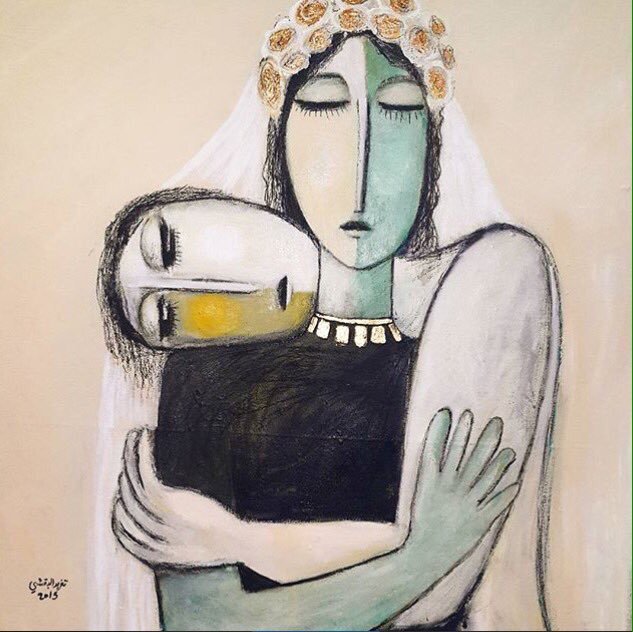Ever since the extremist Shiite men of religion started to have a political role in Iraq, they focused their undivided attention on amending the 'civil status law' to cope it with Islamic Sharia. They ceaselessly attempted to introduce their primordial provisions that can break down the basic pillars of the existing progressive law endorsed in 1959.
Extremist Shiites simply aim at annulling the state law altogether any time in the future. To have their goal achieved, they began as from the year 2003 to empty the law from its contents and deform its texts through introducing a series of amendments to it. Not to mention the other political amendments that had previously been introduced by the ex- Sadam's regime in the course of three long decades.
The new call springs from the old imprinted hatred that has been grown and nurtured by the Shiite clerics throughout six decades due to their very own religious persuasions and convictions and their attempts to Islamize the entire society and subjugate it to their patriarchate authority. A state of affairs that can eventually enable them to distribute the personal destinies among closed rooms each of which is occupied by one of their holy men sitting on the floor as a symbol of humbleness.
Meanwhile, as a symbol of faith, they keep playing a great role in running the entire society as being the guardians of faith. They wanted to tighten their grip on the society relying on their own vague interpretations of some specific texts excerpted from behind- the- time books while giving a blind eye to the world's modern social development on the pretext of safeguarding the sovereign rule of Islamic Sharia.
History in Turmoil
The hard-line attitude adopted by extremist Shiites dates back to ancient times and sounds off whenever attempts are made to endorse any civil status law necessary to meet the genuine needs of the modern and urban development in Iraq, in a manner that can distance both 'family' and 'individual' away from the traditional customs and random discretions offered by patriarchs.
A status law that can rid the society of the social impacts inflicted on the women in such a male - dominated environment that can allow the destiny of women and other daily affairs of the society to be controlled according to old tribal and clannish traditions. A civil status law that can liberate the society from the system of the 'Ottoman' legislative courts that was widespread for over two decades and continued even after the dissolution of the Ottoman State.
It is noteworthy that the Shiite rejection of freeing 'personal affairs' from Islamic jurisprudence is due to their fear of losing the spiritual authority over their 'disciples', leading to the deterioration of the social and political prestige of their authorities. That is why their rejection is openly directed to the 'governance' of personal statuses, consequently making women the most badly harmed category, simply because females are not only subjected to the dominance of social customs and traditions, but also to the strict religious conditions imposed on them. A state of affairs that makes their individual choices reliant entirely on the discretions of Sharia guardians, upon the indisputable religious powers granted to them by the authority in the absence of any social objection from the male-sovereign society, where men care much about protecting their traditional images from being shattered in eastern societies.
The beginning of the social subjugation battle came in 1876, when it took the Ottoman authorities almost ten decades to complete what can be regarded as a modern 'official legal statute' to organize the day to day transactions concerning trade, contracts and penalties, with the adoption of the Islamic 'Hanafi' doctrine.
It was then known as the ' Legislative Rulings Magazine', and its provisions took effect in Iraqi cities solely with no mention whatsoever of the organization of social status affairs in the magazine which seemed to be intentional. However, the 'revolutionary' aspect of this document was their confession that there should be a 'civil' law ''to organize the relations amongst individuals, due to the fact that unlike animals, man is a civilized creature by nature and cannot live individually and needs to work cooperatively with other humans to achieve civilization."
The Shiite jurisdiction sets the minimum age for actual marriage at nine, making it possible for younger ages to make a patrimonial contract of 'sexual flirtation' but without the 'consummation of marriage'. Senior Shiite jurists proved such 'discretional image' in their 'fatwa' but that was later on rejected by both Ayatoullah Mohammed Hussein Fadhl Allah and Ayatou Allah Mohammed Baqer Al Sadr
The civil status affairs remained under the governance of the patriarchs, Muslims or non-Muslims. The first clash broke out after the endorsement of the 'Ottoman family law' in 1917, which was then rejected by the Shiite patriarchs. A situation that generally made the Shiites refrain from presenting their personal status cases to the official judges. One of the judges in the city of Karbala was quoted as saying that he had stayed in office for long nine years without having any single claim.
The Shiite governorship regarded their being sidelined in 'civil status' affairs as a direct assault on their authority, despite the fact that the Shiites were supportive to the 1908 Unity and Advancement Constitution that freed the jurisdiction of the state affairs from 'Sharia law'. That was then rejected by the Sunni men of religion. However, the Ottoman family law emanating from that constitution was then rejected by Shiites but approved by Sunnis.
The paradox thereof is that the 'Ottoman Family Law' is still valid in the Palestinian cities occupied in 1948 and 1967 and lying under the Israeli control. Such law includes all the legislations governing all Christian and Jewish spiritual councils, and other sects and faiths without any amendments, whereas the Lebanese law applies some stipulations from that very same law.
Courts for securing loyalty
In the wake of the establishment of the modern Iraqi state in 1921, it was quite significant from the sheer political point of view to establish closer links between the Shiite sect and the Sunni Royal court to dissipate any fears and in the meantime preserve the national unity of the country by avoiding any divisions that might arise and threaten the already unstable Iraqi throne.
In his capacity as the then Minister of Justice, Naji Al Sweedi, the most prominent writer of the Iraqi royal constitution, submitted the juridical courts law. That law was based on the provisional law of legislative procedures that was endorsed in 1921 and was further consolidated by Article (77) of the Iraqi basic law in 1925, i.e. (the royal constitution). Such steps were actually taken to appease the strict Shiite attitude towards the management of civil status affairs.
In accordance with the above law, juridical arbitration was divided between 'legislative Shiite courts' and Sunni ones, the latter of which was committed to the Ottoman Family Law. The former court was headed by the Shiite scholar Hibatulldin Al Shahrustani.
Some senior British officials like Edgar Bonham Carter, a prestigious judge, and Nigel Davidson, the legal secretary of the British high commissioner, both admitted that the British government was actually behind granting the Shiite patriarchs the authority of managing their own personal status affairs "to secure their support to the regime and the British as well".
That all happened in spite of the opposition expressed by the group of the intelligentsia representing both Iraq's civilian and military elite who had served in the Ottoman state and became later on the government elite of presidents, premiers, ministers, parliamentarians, and military leaders. Their opposition was built on the belief that Iraq is in dire need of a ' civil law' rather than random legislative discretions controlled by turbaned men.
Ayatou Alllah Muhsen Al Hakeem had been leading the direct instigation movement against modernization. He looked upon Abdul Kareem Qassem as a lascivious president leading an anti-Sharia government, while dubbing the Communist Party, whose members were mostly Shiites, as infidels, justifying his attitude by the government's rejection to invalidate the two laws governing personal statuses and agrarian reform.
Nevertheless, the mutual royal - Shiite intimacy did not last long, and the clash between the two parties broke out in 1933 and then in 1945. That was because the successive royal governments were trying to seek a common civil status law. However, the clash eventually ended with the annulment of the legislation and the addition of two appendices, one to the Commercial and Civil Procedures Law (88) of 1956, and the other to Law (40) of 1963.
The diligent Shiites represented the obstinate rock against the introduction of any amendment to the personal status laws, in spite of their reservations on the legislative courts law, which granted them large powers in managing the social affairs of their sect. Their persistent desire was represented in the absolute separation of each and every thing connected with the social and financial affairs of the 'Shiite individual' from the state and subjugate them to the exclusive authority of their men of religion.
Shiite Patriarchs aimed at consolidating their prestigious position and were afraid lest the 'Shiite community' would dissolve within the other 'community of the state' which politically directs its nationals towards citizenship, being then represented by the kingdom and its throne, in addition to the emergence of the overwhelming national and Marxist trends which were then welcomed by some societal milieus.
It was in 1933 when the first government of the nationalist Rasheed Aali Al Keelani submitted a draft law to unify the already effective civil status laws in the Iraqi Kingdom, being the most flagrant example of the "Iraqi social and national divisions". It was one of the bills drafted by the National Fraternity Union of Yaseen Al Hashimi's Establishment. Al Keelani formed a Legal Drafting Commission to prepare the draft law, but his endeavor stumbled after the dissolution of the government by the end of the same year owing to its political failure, and Najaafi pressures.
However, the year 1947 witnessed the revival of the same idea by the government of Hamdi Al Bagaagi that was then called "The Government of Laws". To this end, a committee of four jurists was formed to draft a civil status law statute, and it took them three years of hard work to have it accomplished. But their effort was of no avail and their law was left on the shelves of that government, as a result of the strong Shiite objection being led by Ayatollah Muhssen Al Hakeem, with the support of Mohammed Hussein Al Kashif Al Ghattah, the supreme reference of the Shiite sect.
Al Hakeem unveiled the reason behind his rejection of 1945 draft law in a letter sent in February 1963 to the coup government of Al Baath Party, and reiterated his demand to abolish the law of 1959 that was endorsed by the government of Abdul Kareem Qassim, on the pretext that it was drafted contrary to the 'Islamic Sharia' during the royal era. To make sure his demand would be answered, he dispatched one of his sons to the National Council to urge its parliamentarians to vote against the law, and they were submissive. To save their face, the government was then forced to refer that law to a specialized commission to have it studied and reconsidered.
The Shade of the Turban
Ayatoullah Muhsen Al Hakeem formed a solid opposition wall to hinder any attempt that might be made to change the existing reality of civil statuses in Iraq. He kept on resisting any modernization endeavor made by any government and had been leading resistance to this effect for long decades, Not only this, but he went as far as dubbing Abdul Kareem Qassim 'licentious', leading a government of 'anti- Sharia' members.
His rejection of modernity in Iraq reached its climax in 1959 when he accused Iraq's Communist Party and its members, mostly of whom were Shiites, of being 'infidels'. All his extremist situations toughened more and more when Iraq's republican government refused to invalidate two laws which were originally made to rescue Iraqi citizens from exploitation; namely, Civil Status Law and Agrarian Reform Law.
The liberation of women appeared to be the first cause behind the clash between Qassim and Al Hakeem on one hand, and the animosity between him and the republican regime on the other. The issue of 'Hijab' came to be another reason to construct a barrier between the two men on one hand, and another barrier between two authorities on the other.
According to Fouad Arif, the republican governor of Karbala and Najaf, the refusal by the revolution government to issue a license for printing a Najafi religious booklet entitled " Chastity Between Negativity and Positivity", which includes reactionary ideas, led to the burst of another crisis between the two men, not to mention the ever growing feminine activities in the leftist pro-revolution demonstrations led by women without 'Hijab' in Karbala and Najaf. An entirely rejected activity that made the Shiite patriarchs gather their supporters in two successive counter-demos led by Al Hakeem.
Although the civil status law that organized issues of marriage, divorce, inheritance, polygamy control, and the obligatory minimum age of marriage (between 16 - 18 years), came all in compliance with Sunni jurisprudence, more specifically, 'Al Hanafi Doctrine', yet the Shiites were straightforward in their opposition of the age limit legislated in the law.
The fact of the matter is that the Shiite jurisprudence stipulates the minimum age of actual marriage at 9, and if younger than that, a contract of "sexual flirtation" can be made, but without the actual "consummation of marriage".
That discretional estimation of marriage age was admitted by the senior Shiite jurists in their fatwa. Those religious references were Mohammed Kadhem Al Yazdi, Abul Hassan Al Mousowi Al Asfahani, Muhsen Al Hakeem, Al Khummaini, Abul Qassim Al Khousee, and Al Sistanni, who omitted the provisions of infant marriage from his fatwa, whereas it was rejected by Ayatoullah Mohammed Hussein Fadhlullah, and Ayatoullah Mohammed Baqer Al Sadr.
And in order to add a revolutionary spirit to the new law, inheritance is stipulated to be equally shared between men and women, but that article was later on amended after the military coup of February 1963, to make it identical with the Islamic Sharia provision. Nevertheless, such amendment did not actually put an end to the animosity between Al Hakeem and the Najafi Shiite elite.
Such jurisprudent extremity on the part of senior Shiite jurists who reject any law achieving equality for women and modernity of civil status laws – this extremity is actually referred to the vision of their supreme Shiite reference, Mohammed Hussein Al Kashif Al Ghatta. Reference is also made to the Ottoman Magazine which rejects the appointment of judges by any ruling authority on the pretext that jurisdiction and governorship of Imams (Shiite men of religion) is a heavenly position, without any interference from any secular or other ruling authority.
Hence, their appointment and dismissal falls within the absolute responsibility of Imams anywhere and anytime. They regard justice, reasonability, jurisprudence, and discretion as the pillars on which their rulings are based, no matter what the time or place is.
Back to Roots
When Saddam Hussein took the reins, and even before declaring him as the absolute president of Iraq, the authority made a series of amendments to the civil status law set by the first republic. And in the course of 30 long years, at least more than 10 amendments were introduced to the law, targeting opposition powers who were denied access to their inheritance and marital rights; and face the other phenomenal conditions produced by the long war with Iran; particularly the growing number of POWs and missing soldiers.
Some of those amendments targeted women through granting them a wider space in the society. Meanwhile, some of the amendments introduced in the 90s moved towards 'Islamism', when the head of the regime launched an 'Islamic campaign' to further close ranks between the authority and the Iraqi society, and in the meantime establish better relations with the Shiite majority.
And despite the fact that the process of religious patching had taken an extremist route, yet it produced some phenomena that consequently distanced the society far away from the existing modern state, through adopting religion as a system of daily lifestyle, In its tireless attempt to protect its entity, the authority encouraged wearing 'Hijab', and aroused a Sunni - Shiite competitive debate over the eligibility of Islamic Sharia to govern the day to day affairs of the society.
The risks of going back to the "Jafaari law" are actually still persistent by introducing it anew but under a different 'title that might cover up any sectarian sensitivity to its present name while preserving its core context
The moment that witnessed the collapse of a repressive and totalitarian regime was not more than a fast escalating societal violent uprising growing throughout the country in an exciting worrying manner, specifically in Basra south of the country.
That was accompanied by other attempts made to impose 'Islamisation' over the society but in the Shiite pattern through investing the consent of the large majority of people who seemed to have been indulging in a state of 'historical suppression', and affected by overwhelming religious sentiments after the emergence of the religiosity current particularly after the Second Gulf War (invasion of Kuwait).
It was much like a compelling compensation to overcome the state of their hostility towards the repressive ideologies and practices of the former regime, but that seemed to be a kind of turbulent religious floundering mixed with superficial sentiments to justify defending their repressive egos and in some way it appeared to be an act of revenge on 'secularism' that had flourished with the beginning of establishing the modern British Iraq in 1921.
The weakest ring to effectuate the new pattern of thoughts on the ground was the violation of women freedom that had been gained through a long struggle, with the support of a number of positive policies since the issuance of Law (1959).
The first agonizing attempt or rather catastrophe in their endeavors to deprive women of their hard-gained rights came from the then acting president of the ruling council, Abdul Aziz Al-Hakeem, son of the extremist Shiite, Ayatoullah Muhssen Al Hakeem, who had previously opposed the issuance of Resolution (137). That was actually a reactionary return to the older policies practiced by men of religion who were used to impose their very own religious interpretations on the society as a whole and drive the country back to the dark period preceding the establishment of modern Iraq.
And despite of the annulment of the aforementioned resolution later on with the approval of the large majority of the Ruling Council's members, yet the idea of dominating the civil status aspects remained persistent in the extremist Shiite mindset and had always been given their unbroken attention, until they eventually managed to achieve their goal through adding Article (41) to the Iraqi Permanent Constitution endorsed in 2005, giving people the choice to seek arbitration in their own personal affairs, each according to his or her faith.
This article states, "Iraqis are free to manage their own civil personal affairs, according to their faiths, sects, beliefs and choices, and that should be regulated by a law". The fact of the matter is that such wording was formed by the US Ambassador to Baghdad in 2005 in his attempt to satisfy the Shia extremists who were determined to revoke the very same law.
That article actually faced a wave of large objections and a number of Iraqi female MPs saw that it might 'open the door for random 'fatwa' affecting the destinies and entities of families besides causing the breakdown and displacement of their members, and that can eventually lead to deepening the spirit of sectarianism and domestic disintegration within the Iraqi society ".
And whereas men of religion were stigmatized as being anti-feminism, counter efforts were exerted by extremists to discredit feminists and pro-women activists and accuse them of being anti-Islam and not representing the entire Iraqi society. Activists were repeatedly pictured as being separated from the reality in Iraq. An organized campaign against feminism turned later on into different atrocious anti- women attacks, on the pretext of infringement of Islamic Sharia and social customs and traditions by females. That actually happened so often particularly in 2005-2008.
As per the police records and statistics covering 3 years (2005-2008), the number of victims in Basra only amounted to 85 women in 2005, on the pretext of their violation of Islamic Sharia. This number went up to reach as high as 96 victims in 2006, but the homicide rate decreased to 50 victims in 2008. That all happened during a military campaign launched by the government against extremist militias.
And despite the denial of the local government at that time, claiming that such crimes were individually committed and not representing an organized homicide against women. However, most of the women were butchered on mere suspicion or out 'of honor washing', or for their rejection to respond with male sexual advances, or refusal to have affairs with militiamen due to the social and categorical distinctions between them. Yet, the similarity and resemblance of the horrible way of homicide refer beyond any doubt that the involved parties are not different, and their killing tactics are all identical, including brutal physical torture with sharp tools, gunfire shots, abdomen stabbing, eye piercing, and deadly electrocution.
Gafaari Law
In mid July 2013, the Iraqi Minister of Justice, Hassan Al Shimmary, shocked the society with his declaration of two closely connected draft laws, namely; 'Jafaari Legislative Jurisdiction Law' and 'Jafaari Civil Status Law.'. These two laws were submitted to the government and then forwarded to the Council of Representatives. Such procedure was then challenged by a wave of protests from the urban weighty circles in the southern governorates and in the capital Baghdad, not to mention the storm of the Sunni and feminist objections within the Council of Representatives.
These disapprovals constituted a solid defensive wall obstructing the endorsement of the two bills, which actually represent a serious precedent in deepening sectarian divisions in the country. What seems worse is that the Ministry of Justice had not issued similar draft laws either to the Sunni sect or to the other remaining faiths, thus giving a clear cut evidence of its unfair prejudice against the non- Shiites and at the heavy cost of the other sects of the society.
There was a strong belief that the 'Islamic Virtue Party' with its spiritual leader Ayatoullah Mohammed Al Yakooby were the motive powers behind the action taken by Al Shimmary to pave the way for winning the elections of 2014 after the party had lost its political weight and its seats in both the provincial councils and in the Council of Representatives. It was actually a 'sectarian' political venture that might devastate the already vulnerable unity of the country for the sake of winning several seats and other narrow political privileges.




